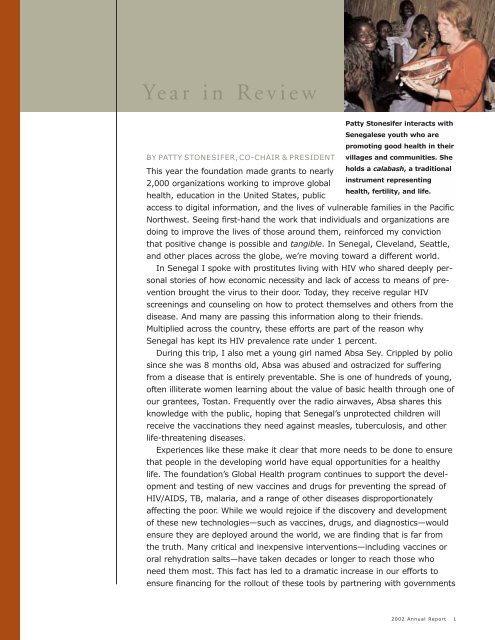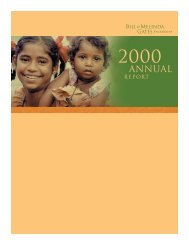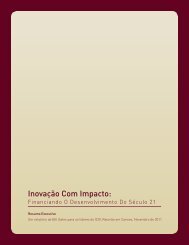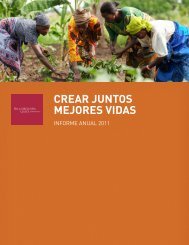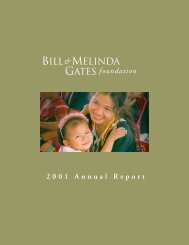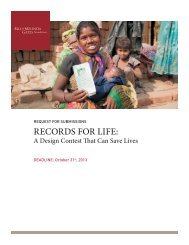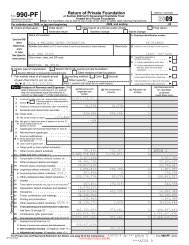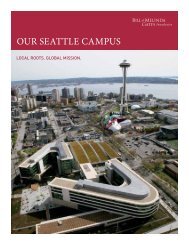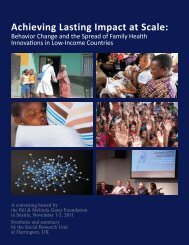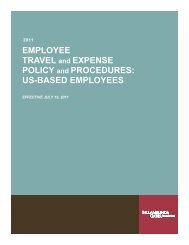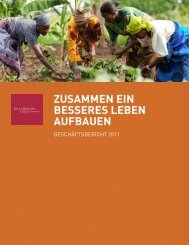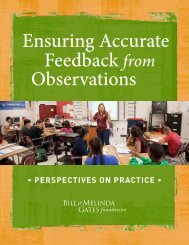2002 Annual Report - Bill & Melinda Gates Foundation
2002 Annual Report - Bill & Melinda Gates Foundation
2002 Annual Report - Bill & Melinda Gates Foundation
Create successful ePaper yourself
Turn your PDF publications into a flip-book with our unique Google optimized e-Paper software.
Year in Review<br />
BY PATTY STONESIFER,CO-CHAIR & PRESIDENT<br />
Patty Stonesifer interacts with<br />
Senegalese youth who are<br />
promoting good health in their<br />
villages and communities. She<br />
This year the foundation made grants to nearly holds a calabash, a traditional<br />
instrument representing<br />
2,000 organizations working to improve global<br />
health, fertility, and life.<br />
health, education in the United States, public<br />
access to digital information, and the lives of vulnerable families in the Pacific<br />
Northwest. Seeing first-hand the work that individuals and organizations are<br />
doing to improve the lives of those around them, reinforced my conviction<br />
that positive change is possible and tangible. In Senegal, Cleveland, Seattle,<br />
and other places across the globe, we’re moving toward a different world.<br />
In Senegal I spoke with prostitutes living with HIV who shared deeply personal<br />
stories of how economic necessity and lack of access to means of prevention<br />
brought the virus to their door. Today, they receive regular HIV<br />
screenings and counseling on how to protect themselves and others from the<br />
disease. And many are passing this information along to their friends.<br />
Multiplied across the country, these efforts are part of the reason why<br />
Senegal has kept its HIV prevalence rate under 1 percent.<br />
During this trip, I also met a young girl named Absa Sey. Crippled by polio<br />
since she was 8 months old, Absa was abused and ostracized for suffering<br />
from a disease that is entirely preventable. She is one of hundreds of young,<br />
often illiterate women learning about the value of basic health through one of<br />
our grantees, Tostan. Frequently over the radio airwaves, Absa shares this<br />
knowledge with the public, hoping that Senegal’s unprotected children will<br />
receive the vaccinations they need against measles, tuberculosis, and other<br />
life-threatening diseases.<br />
Experiences like these make it clear that more needs to be done to ensure<br />
that people in the developing world have equal opportunities for a healthy<br />
life. The foundation’s Global Health program continues to support the development<br />
and testing of new vaccines and drugs for preventing the spread of<br />
HIV/AIDS, TB, malaria, and a range of other diseases disproportionately<br />
affecting the poor. While we would rejoice if the discovery and development<br />
of these new technologies—such as vaccines, drugs, and diagnostics—would<br />
ensure they are deployed around the world, we are finding that is far from<br />
the truth. Many critical and inexpensive interventions—including vaccines or<br />
oral rehydration salts—have taken decades or longer to reach those who<br />
need them most. This fact has led to a dramatic increase in our efforts to<br />
ensure financing for the rollout of these tools by partnering with governments<br />
<strong>2002</strong> <strong>Annual</strong> <strong>Report</strong> 1


